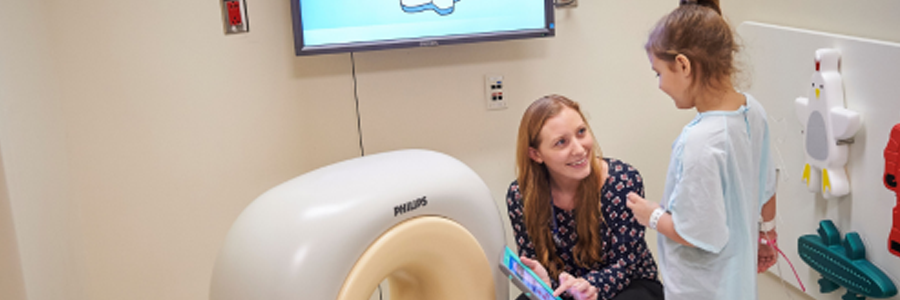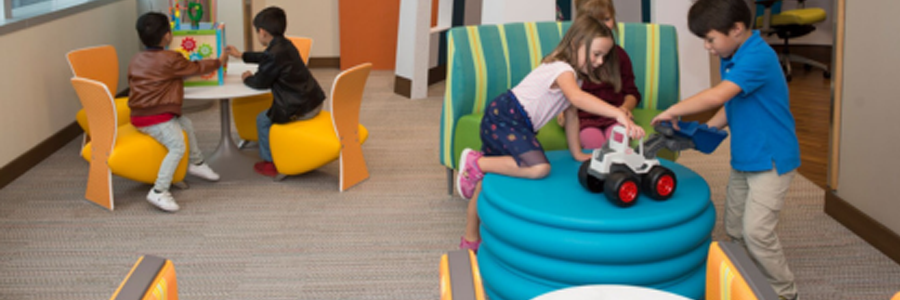Tips from Stony Brook's Pediatric Surgery Department and Child Life Program
Having a surgical procedure can be unsettling, even scary for some. For children, even more so. And for children with Autism Spectrum Disorder (ASD), a surgical experience can have a severe impact on their mental and emotional well-being. Autism, a developmental disorder, can affect communication skills, behavior and cause sensory overstimulation, which can all be exacerbated by being in a hospital or surgical environment.
(631) 444-KIDS (5437)
 A Stony Brook Child Life Specialist demonstrating a mock CT machine
A Stony Brook Child Life Specialist demonstrating a mock CT machine
As part of our recognition of Autism Awareness/Acceptance Month, we reached out to physicians from Stony Brook's Department of Pediatric Surgery and our Child Life Program and asked for advice about preparing ASD children for surgery. Whether the child is having a scheduled surgery, or an emergency surgical procedure, these tips will help make the experience more tolerable and less stressful for the child (and the parents):
PRE-SURGERY DAY(S)
A common point among those we interviewed was the importance of parental involvement. "You know your child best! You know ways in which they cope and the best way in which they interact with the world around them," said Aubrey Bergeron, MS CCLS (Certified Child Life Specialist)of Child Life. She also suggested that parents ask the surgeon if special accommodations can be made for their child (if needed) ahead of the surgery date. Michelle L. Ceo, RN, CPN, CPNP-PC of Pediatric Surgery, said she discusses with parents how their child reacts to stimuli, and encourages them to verbalize with the surgical team about what works best for their child.
Other advice included learning the names of the staff (doctors, anesthesiologists, etc.), previewing what physical areas that the child will need to interact with on surgery day, being open and honest with the child and using words like surgery, anesthesia and hospital. Another good tip for parents was to care for yourselves! Remember to pack items of comfort for yourself (because if you're not relaxed, neither will your child be).
THE DAY OF SURGERY
 Bring Comfort Items from Home for Your Child
Bring Comfort Items from Home for Your Child
Stony Brook pediatric surgeon Kristen Calabro, MD, MBS, advised "Bring something that you use at home to calm the child…It will provide them a focus point and also provides the surgeon something to bond with them over." Bergeron and Ceo agreed, "Make sure to pack 'lovies' and/or anything comforting the child will relate to," said Bergeron.
Ceo and Calabro both recommended minimal stimuli and a quiet room for pre-op. Ceo said she, "speaks quietly [and] explains everything to the child before it is done, including physical examinations." Other tips included telling the child that they will be taking a trip to the hospital, providing words of encouragement and offering developmentally appropriate responses to questions they may have. If the child has had previous hospital/surgical experiences, remember what worked best (e.g., they did very well when holding their hand or they did not do well with the door shut).
PRE-OP ROOM
In the pre-op room, Child Life plays a big role in comforting and preparing the child for the next step: surgery. Bergeron introduces herself to the patient and family by saying, "I am here to make the day a little bit easier, and to be a friendly face throughout the process." She provides comfort items and also evaluates the situation to determine how she will best benefit the child.
If the child can express that they want to know everything that's going to happen, she will explain it step-by-step: "We will stay in this room for a little while [and] the doctors and nurses [will] come to see you [later] we will be going to another room [the OR]." She also will offer to show the child items like the anesthesia mask, EKG leads and Pulse Ox. Finally, she will follow the patient from pre-op to the OR to the post-op recovery room.
POST-OP RECOVERY ROOM
After the surgery is complete, in the post-op recovery room, the child's parent will be brought in after the medical staff has completed their post-op tasks. Having a parent present when they awaken from the anesthesia will help the child have a familiar frame of reference. Bergeron recommends that the parent should "Offer comfort. It will often times take the child a little while to re-adjust themselves after anesthesia. So speak slowly and let them know you're with them."
She also stresses the importance of rest. "Let your child rest as much as needed. Some kids will wake up and fall right back to sleep and that's okay! If they are sleeping let them," she said. And, if the doctor or nurse says it's okay, "Offer yummy treats, e.g., drinks and or items light on their stomach."
POST-OP ADMITTANCE
 Time in the playroom can help ease anxiety
Time in the playroom can help ease anxiety
Sometimes a child will be admitted to the hospital for post-op observation, pain management or follow-up procedures. For children on the autism spectrum, this is a potentially unsettling and traumatic interruption to their regular routines and comfort levels. While the child's surgeons will check in on them during this time, Calabro and Ceo stressed the importance of loved ones and Child Life working together to help the child feel at ease.
"Try to keep to the child's routine as much as possible," said Bergeron. "Incorporate anything they love and enjoy: music, shows, toys, family members." In addition, parents should get to know the staff (have conversations with them about goals and objectives for being discharged), learn the area where the child's room is and, if the child is mobile, find out if they are allowed to leave their room to go to one of the playrooms or the lounge. But, most importantly, parents should be open and honest with the child and do whatever necessary to make them feel safe and comfortable.
Children with autism require a specialized approach to address their unique needs. This specialized approach is even more important when preparing a child with autism for surgery. At Stony Brook, our pediatric surgeons, Child Life specialists and the child's parents work together to ensure that the child will receive the medical care they need, while feeling safe and supported.

